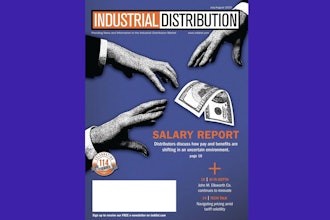
The “people buy from people” pronouncement is most commonly used as an attempt to smuggle a false assumption into a conversation. The pronouncement tends to be delivered by salespeople (and their managers) as part of a defense of the traditional relationship-based sales model.
This tactic is more effective than it should be because people buy from people appears to be a truism— executives nod in agreement without questioning the truth status of the utterance.
Of course, it’s not necessarily true that people buy from people. They do sometimes, but in many more cases, they don’t — which is to say that this statement is more false than it is true.
A more accurate observation would be that people buy from people, until they don’t.
This reframing captures the important, and inescapable, fact that in pretty much every sector of the economy, there’s a trend away from human-to-human transactions.
History shows that, given the choice between transacting with a human and transacting with a machine, folks will overwhelmingly favor the latter.
It turns out that even the people who argue that people buy from people are not immune to this trend. Next time you encounter someone trafficking in this assumption, ask them to recall the last time they purchased stocks, the last time they purchased a computer, or the last time they purchased a motor vehicle.
If they admit that they purchased stocks from E*TRADE, a computer from Dell, or a motor vehicle from Tesla, then they are aiding and abetting in the demise of the traditional stockbroker, the computer retailer, or the auto dealership. Consequently, their “people buy from people” exhortation should be challenged.
Perversely, the “people buy from people” argument is anti-human. It’s an attempt to trap humans in roles that could be performed better by machines when there is no shortage of more meaningful work for our carbon-based cousins.
Take sales, for example.
If you hired a capable salesperson, would you want that person to spend their time processing repetitive transactions when they could otherwise be engaged in the pursuit of brand-new customers? This is not an idle inquiry. The traditional relationship-based sales model absolutely does trap salespeople in the management of repeat transactions. It turns them into over-paid, semi-mobile customer service reps — living in fear of their eventual extinction.
The alternative is to focus salespeople exclusively on the pursuit of new business — an endeavor that adds significantly more value to the organization, and one that is unlikely to be challenged by a machine anytime soon.
At this point, some straight talk about the role of people (and relationships) in transactions will be beneficial.
Customer behavior suggests that, where repetitive transactions are concerned, a relationship with a salesperson (or any person, for that matter) is only valuable to the extent that the vendor is operationally dysfunctional.
It’s true that a salesperson can add value to a customer – in the short term – by insulating that customer from chaos in operations. However, a wise business leader will recognize that it makes sense to first build an organization that is operationally excellent and then provide customers a friction-free interface with that efficient operational machine; think Amazon Web Services, Dell, Tesla, Robinhood or McMaster-Carr.
It’s also true that this argument has limited application to bespoke services (management consulting, plant automation, system integration and the like). However, that same wise business leader will also recognize that today’s bespoke service is tomorrow’s configure-to-order solution — and that the organization that leads the commoditization of bespoke services is most likely to accrue the greatest economic benefit.
The moral of the story is that healthy skepticism is warranted whenever you hear that common “people buy from people” refrain. Or, more generally, it’s wise to be on the lookout for falsehoods posing as truisms: the motives of those trafficking in these suspect ideas may not be as innocent as they appear.
Justin Roff-Marsh is the founder and president of Ballistix and the author of The Machine: A Radical Approach to the Design of the Sales Function.























